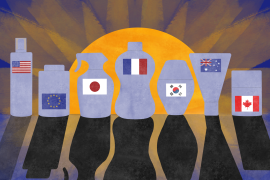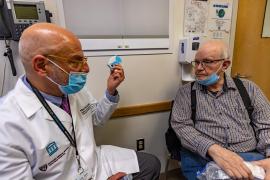FDA Expected To Approve Antiretroviral Drug Fuzeon This Week; Advocates ‘Anxious’ About Pricing
Fuzeon, a new antiretroviral drug designed for patients who have failed to respond to other medications, is "likely" to gain FDA approval by the end of the week, the Raleigh News & Observer reports. Under the priority review status granted to Fuzeon by the FDA in September, the agency is supposed to take action by March 16. Since that date falls on a Sunday, analysts expect action on the drug by the end of the business day tomorrow. "I expect it to be approved outright. ... It is a great drug with great data," David Bouchey, an analyst at C.E. Unterberg, Towbin, said. Trimeris, the biotech company that developed the drug, and Roche, the Swiss pharmaceutical company producing and marketing the drug, expect to begin shipping Fuzeon in late March or early April pending FDA approval (Ranii, Raleigh News & Observer, 3/13).
Drug Pricing
While the companies cannot release pricing information until the drug has been approved, Roche's recent announcement of the European pricing for the drug -- approximately $20,409 per patient per year -- has made AIDS advocates "anxious," the AP/St. Petersburg Times reports (Agovino, AP/St. Petersburg Times, 3/13). Trimeris CEO Dani Bolognesi said in a recent interview that while drugs "invariably cost more" in the United States, Fuzeon will be an exception (Raleigh News & Observer, 3/13). Regardless, the European price is almost triple the cost of the most expensive antiretrovirals on the market, and AIDS advocates fear that the additional $14,000 a year that it would add to the traditional combination drug therapy may be prohibitive for low-income patients. Budget deficits have led to cuts in Medicaid, which pays for about 50% of all AIDS-related drugs, and federal- and state-funded AIDS Drug Assistance Programs, which pay for about 30% of the drugs, according to the AP/Times. "We don't think we can add Fuzeon (to our drug list) without cutting something else. We are excited about the drug, but we aren't sure we can afford it," Michael Montgomery, head of California's ADAP, said (AP/St. Petersburg Times, 3/13). Roche attributes the drug's high price to its "extraordinarily difficult" manufacturing process, which requires 106 chemical reactions, more than 10 times the number for most other antiretroviral drugs (Kaiser Daily HIV/AIDS Report, 2/24).
Supply and Demand
Some analysts said that the pricing reflects the fact that demand for the drug is expected to outstrip supply. "The price is high because of limited capacity. They have to price it at a level where not everyone can afford it," Martin Hall, an analyst at HSBC, said. Others said that the companies are taking advantage of their initial monopoly on the market and that Roche must share its profits with Trimeris. Franz Humer, chair and CEO of Roche, said that the price reflects the $600 million cost of the drug's development, as well as the cost of manufacturing and research for other AIDS medications. Analysts said that with this pricing, the companies could begin to make a profit on the drug in three years -- much less than the industry average of 16 years. "I think it is an aggressive pricing strategy," Henry Grabowski, an economics professor at Duke University, said. "Our job is to innovate and bring medicines to the market that alleviate suffering and cure disease. The industry has done a good job. But it is the job of society and its members to decide how much to spend on the well-being of the population," Humer said (AP/St. Petersburg Times, 3/13). A Fuzeon follow-up product, T-1249, is currently in development and has been shown in clinical trials to reduce viral levels in patients who have developed resistance to other medications, including Fuzeon (Raleigh News & Observer, 3/13).






